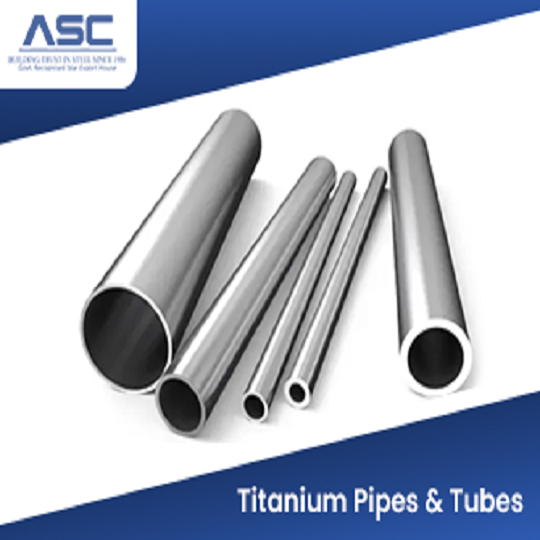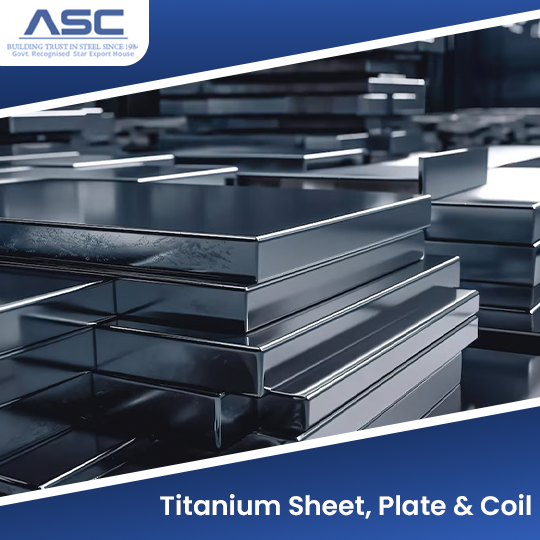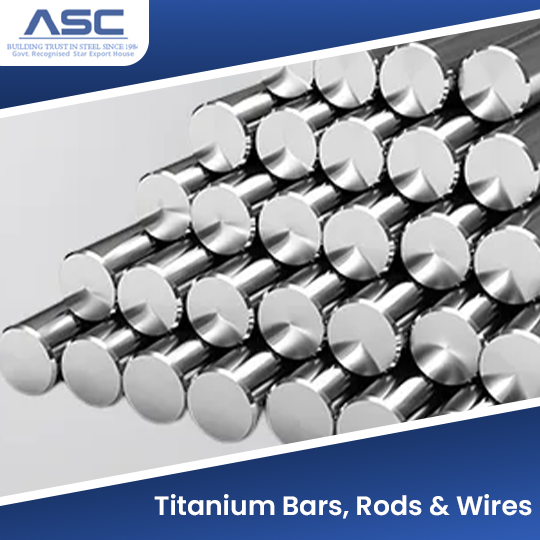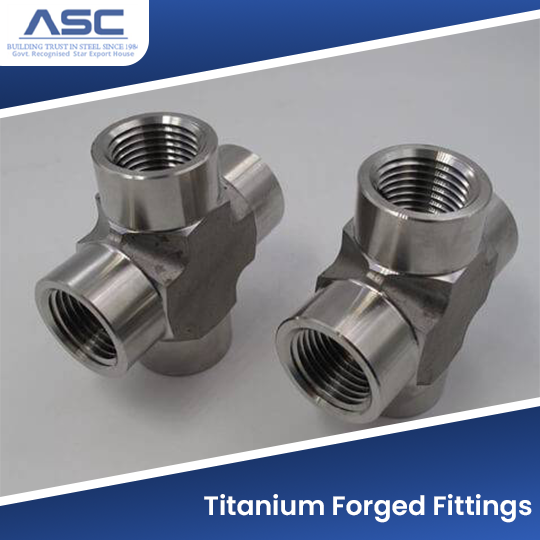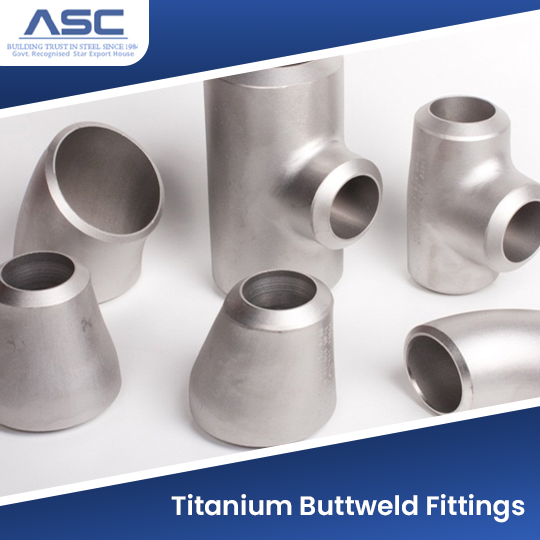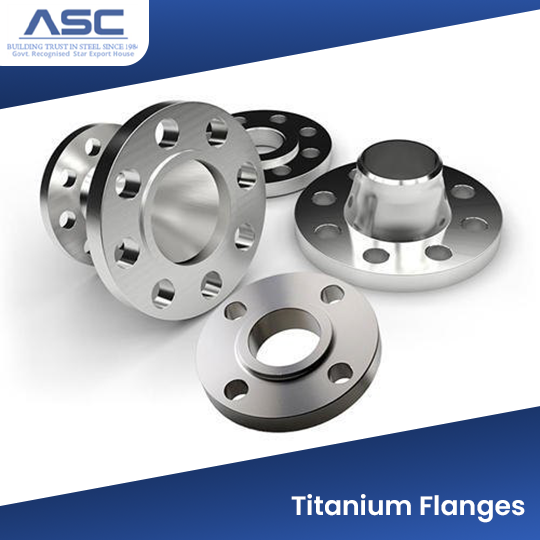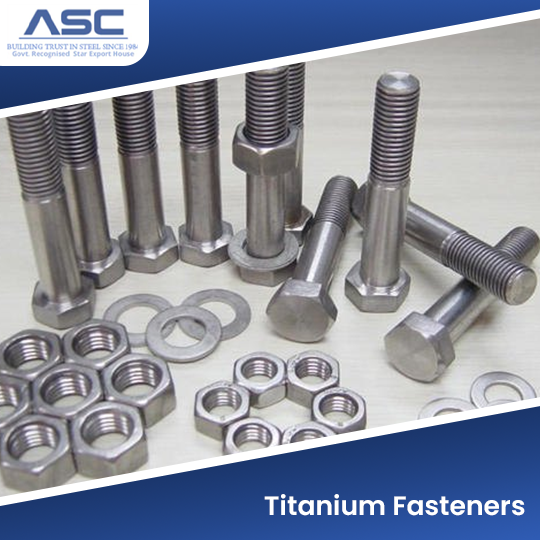Titanium Products in India, Titanium Products Manufacturer, Titanium Products Supplier, Titanium Products Exporter
Amardeep Steel is a renowned titanium supplier and one of the leading titanium manufacturers in India, offering a wide array of high-quality titanium products. Our extensive selection includes titanium plate and sheet, titanium pipes and tubes, titanium flanges, titanium fasteners, titanium forged fittings, and titanium bars. As one of the top titanium manufacturing companies in India, we are known for our commitment to quality and customer satisfaction across various industries.
Our titanium products are made using premium materials and tested to meet stringent industry standards. With a wide range of sizes, specifications and composition, we ensure that our products cater to diverse applications. Whether you require titanium equipment for aerospace, oil and gas, or marine applications, we offer products in multiple titanium products grades, including commercially pure titanium and popular alloys like Ti-6Al-4V.
As a trusted titanium alloy supplier, Amardeep Steel focuses on delivering superior products and custom solutions to meet your specific needs. With our expertise and dedication, we stand out among titanium manufacturing companies in India by consistently delivering top-quality titanium products that exceed expectations. Contact us today to explore our wide range of titanium products and find the ideal solutions for your business.
What is Titanium?
Titanium is primarily found in nature in the form of its oxide. Its commercial production is carried out using the “Kroll Process,” which involves treating titanium ore with chlorine gas to form titanium tetrachloride. This compound is then purified and reduced using magnesium or sodium to produce metallic titanium sponge. At Amardeep, this sponge undergoes alloying and melting to achieve high-quality titanium suitable for various applications.
Although effective, the Kroll Process is relatively expensive due to its labor-intensive steps. Global titanium production currently reaches approximately 100,000 tons per year. Titanium (Ti) is celebrated for its lightweight nature, exceptional strength, and outstanding resistance to corrosion.
Discovered in 1790, titanium only entered industrial production in 1948, following decades of research and development. Thanks to its abundant reserves and remarkable biocompatibility, titanium is widely used across industries. Continuous innovation has expanded its applications, making it a highly versatile and valuable material today.
Titanium Alloy Products List
Titanium Specifications
Our titanium products meet stringent international standards and are available in various grades to suit a wide range of industrial applications.
| Titanium Grades | Titanium Gr.1, Titanium Gr.2, Titanium Gr.3, Titanium Gr.4, Titanium Gr.5 / TI6AL4V |
|---|---|
| Standard | ASTM, ASME, DIN, JIS, BS, and all International Standards |
| Titanium Products | Titanium Round Bar, Titanium Sheet/Plate/Coil, Titanium Pipe Fitting, Titanium Forged Fitting, Titanium Flanges, Titanium Fasteners, Titanium Valves and many more. |
Titanium Chemical Composition
| CHEMICAL COMPOSITION | ASTM Grade | ||||||
|---|---|---|---|---|---|---|---|
| Element | 1 | 2 | 5 | 7 | 9 | 12 | 23 |
| N, Nitrogen | 0,03 | 0,03 | 0,05 | 0,03 | 0,02 | 0,03 | 0,03 |
| C, Carbon | 0,1 | 0,1 | 0,1 | 0,1 | 0,05 | 0,08 | 0,08 |
| H, Hydrogen | 0,015 | 0,015 | 0,0125 | 0,015 | 0,013 | 0,015 | 0,0125 |
| Fe, Iron | 0,2 | 0,3 | 0,4 | 0,3 | 0,25 | 0,3 | 0,25 |
| O, Oxygen | 0,18 | 0,25 | 0,20 | 0,25 | 0,12 | 0,25 | 0.13 |
| Pd, Palladium | - | - | - | 0,12-0,25 | - | - | - |
| Al, Aluminium | - | - | 5,5-6,75 | - | 2,5-3,5 | - | 5,5-6.5 |
| Mo, Molybdenum | - | - | - | - | - | 0,2-0,4 | - |
| V, Vanadium | - | - | 3,5-4,5 | - | 2,0-3,0 | - | 3,5-4,5 |
| Ni, Nickel | - | - | - | - | - | 0,6-0,9 | - |
| Ti, Titanium | Bal. | Bal. | Bal. | Bal. | Bal. | Bal. | Bal. |
Titanium Mechanical Properties
| MECHANICAL COMPOSITION | ASTM Grade | ||||||
|---|---|---|---|---|---|---|---|
| Grade 1 | Grade 2 | Grade 5 | Grade 7 | Grade 9 | Grade 12 | Grade 23 | |
| Tensile strength, min (Mpa) | 240,00 | 345,00 | 895,00 | 345,00 | 620,00 | 483,00 | 828,00 |
| Yield strength, 0,2% Offset, min (Mpa) | 170,00 | 275,00 | 825,00 | 275,00 | 483,00 | 345,00 | 759,00 |
| Elongation (in 4D, min, %) | 24,00 | 20,00 | 10,00 | 20,00 | 15,00 | 18,00 | 10,00 |
| Reduction of Area, min, % | 30,00 | 30,00 | 25,00 | 30,00 | 25,00 | 25,00 | 15,00 |
| Hardness * Interpolated | Rb70 | Rb80 | Rc36 | Rb80 | Rc28 | Rc17* | |
Titanium Application and Uses
Titanium is a versatile and highly sought-after material due to its unique combination of properties,
including its low density, high strength, corrosion resistance, and biocompatibility. As a result,
titanium is used in a wide range of applications across industries, including:
- Aerospace and Aviation: Titanium is commonly used in the aerospace and aviation industries due to its high strength-to-weight ratio, corrosion resistance, and ability to withstand extreme temperatures. It is used in aircraft parts such as landing gear, wings, and engine components.
- Medical Implants: Titanium's biocompatibility and corrosion resistance make it an ideal material for medical implants, including hip and knee replacements, dental implants, and pacemaker casings.
- Marine and Offshore: Due to its excellent resistance to saltwater corrosion, titanium is often used in marine and offshore applications, such as shipbuilding, oil and gas production, and offshore wind farms.
- Sports Equipment: Titanium's high strength and lightweight properties make it ideal for use in sports equipment such as golf clubs, bicycle frames, and tennis rackets.
- Chemical Processing: Titanium's corrosion resistance makes it an excellent material for use in chemical processing equipment such as tanks, valves, and pumps.
- Architecture and Construction: Titanium is increasingly being used in architecture and construction for its unique aesthetic qualities and durability. It can be used in cladding, roofing, and facades, among other applications.
Competitive Titanium Prices for Every Industry
Looking for high-quality titanium plate and sheet, titanium bars, rods & wires, and more? At Amardeep Steel, we offer premium titanium products at competitive prices, tailored to meet the needs of industries such as aerospace, electronics, and chemical processing.
Our titanium prices and the cost of titanium in India are aligned with current market trends, providing cost-effective solutions without compromising on quality or performance. Every product is manufactured with precision to ensure superior durability and reliability.
Request a quote today and discover how our products can enhance your projects with unmatched quality and value.
Frequently Asked Questions
1. Is titanium stronger than steel?
Titanium and stainless steel are different in a few key ways. Titanium is 30% stronger than steel but weighs nearly 43% less, making it much lighter. It’s also 60% heavier than aluminum but twice as strong. One of titanium's best features is its excellent resistance to corrosion and its high strength compared to its weight.
2. Is titanium in high demand?
Yes, titanium is in high demand because of its great properties, like being strong but lightweight, resistant to corrosion, and safe for use in the body. These qualities make it essential for industries such as aerospace, automotive, medical, and various industrial applications.
3. What is titanium used for?
Titanium is a versatile material used across many industries due to its unique properties. Its primary applications include aerospace and aviation (for aircraft components), medical implants (for artificial joints and dental implants), marine and offshore (for shipbuilding and oil platforms), sports equipment (for golf clubs and bicycle frames), and chemical processing (for tanks and valves).
4. Is titanium expensive?
Yes, titanium is considered an expensive material. Its high cost is due to the complex and energy-intensive extraction and processing methods required to purify it from its ores. This makes the titanium products price higher than more common metals like steel and aluminum.
5. Can titanium rust?
No, titanium does not rust. Rust is a specific type of corrosion that occurs in iron and its alloys. While titanium can corrode, it is highly resistant to it. When exposed to oxygen, titanium forms a thin, tough, and highly protective oxide layer on its surface. This passive layer acts as a barrier, preventing further corrosion and making titanium exceptionally durable in harsh environments, including saltwater.
6. Is titanium stronger than steel?
Titanium and stainless steel are different in a few key ways. Titanium is 30% stronger than steel but weighs nearly 43% less, making it much lighter. It’s also 60% heavier than aluminum but twice as strong. One of titanium's best features is its excellent resistance to corrosion and its high strength compared to its weight.
